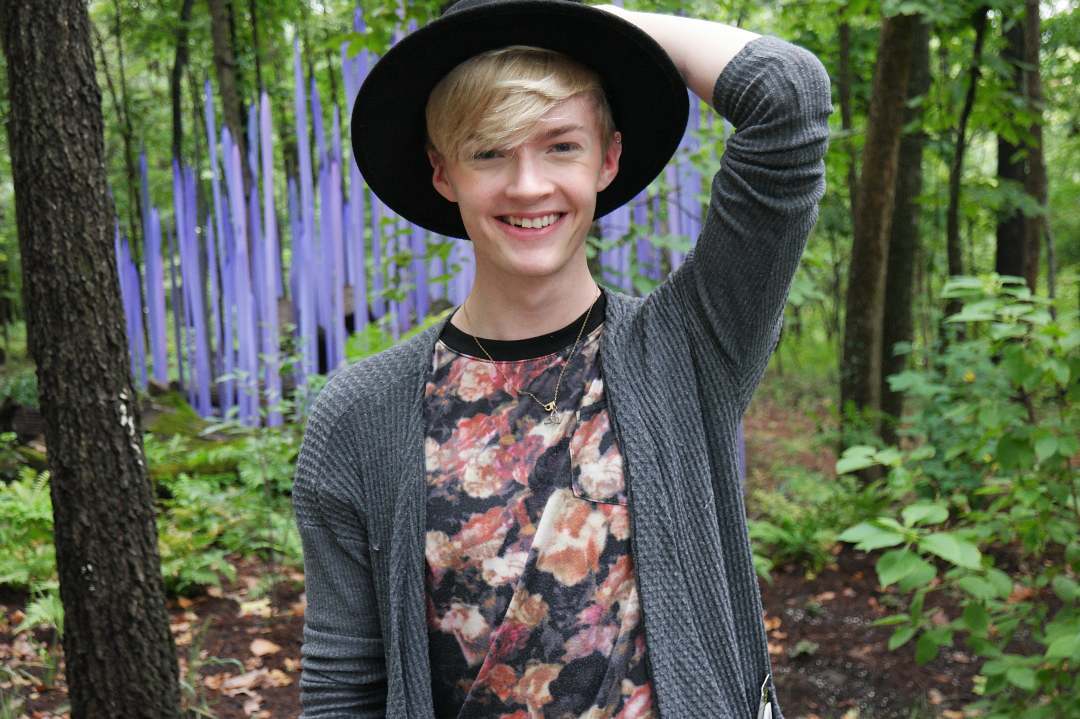
CJ Colbert is a biology and pre-nursing student at Drury University. CJ identifies as non-binary and uses they/them pronouns. They serve as the Vice President of Allies, Drury’s LGBTQ+ campus support group, and as the Social Media Coordinator of Drury’s newly re-branded Gender Intersectionality Collective.

How often does gender come up in your biology classes?
Gender nor sexuality have ever been discussed in any of my academic curriculum. My advisor and my Cellular [Biology] teacher are really good about it, but it’s never been a thing talked about in school. Everything that I’ve learned I’ve learned from local organizations and people online, or from friends that I’ve known. However, sex, the way it’s been explained since I’ve been here at Drury, is that sex is not purely physical. You can have female chromosomes with male genitalia, as well as male chromosomes with female genitalia, or a mix of male and female genitalia. You’re never going to be able to tell somebody’s sex just by looking at them.
How would you describe gender to someone who is new to the idea?
Gender is going to be something that’s definitely different for each and every person. Nobody ever experiences their gender in the exact same way. The most basic way to think about it is like whenever you were little, you always had the girls who identified as girls, but they were known as ‘tomboys.’ They were girls, but they dressed in something that wasn’t considered feminine. To flip that, you really never saw a boy who identified as a boy dressing in anything that was feminine, because it’s something that’s very controlled by society. It’s something that if you do not follow the expectations, then you’re most likely going to be shunned from a lot of social groups and opportunities. It wasn’t until just years ago that I even understood that you didn’t have to be one extreme or the other. You didn’t have to necessarily be a boy or a girl. But lately a lot of things have been happening, and a lot of opportunities have been opening up. For example, I’m heavily involved in the cosmetics industry, and something that’s becoming more common are male makeup artists. They are cisgender, they identify as male, but they do something that is heavily associated with femininity. That doesn’t change anything. They are still male. They just like to wear makeup.
This brings up the distinction between gender identity and gender expression. What can you say about this?
Gender identity is what you identify as. This is my name. This is what I want to be called. This is how I feel. These are the pronouns I want to use. These are the pronouns that I expect, actually. This is who I am, whereas gender expression is going to be how you present. You may present as the sex that you were assigned with and the gender you were assigned with, or you may present in a totally other form while still identifying with the gender that aligns with your assigned sex. You can identify as male while having a feminine expression, or the other way around where you identify as female but you have a more masculine presentation. Or you can be completely androgynous, identifying as both and/or presenting as both. Whoever you identify as is who you are, and it doesn’t matter, especially for non-binary people, how you present.
What is something that you wish people who are cisgender or experience gender in a very binary way could understand?
It’s confusing. I understand. It’s not something that we’ve talked about for ages. It’s always been a thing. It’s something that we’ve seen in hundreds of cultures. It’s not like it’s just appearing out of nowhere. It’s just been suppressed for so long because nobody wanted to talk about it. There’s absolutely no way for you to just lay all of this out in front of somebody and it totally makes sense within five minutes. This is something that you learn about every day of your life. So if you don’t understand it, respect it. Call people by their correct pronouns. Call people by their correct name. It costs absolutely nothing to be a good person, and that is how you do it.
What would you say to someone who doesn’t recognize genders outside the binary?
That seems super hard for some people to understand. All I can tell you right now is that I’m me, and that’s all you need to know. There’s really not much else you can say at that point except that, “this is how it is.” If you are down and determined to insist that there are only two [genders], I cannot get through to you. I cannot help you. I cannot educate you. But the world is going to keep progressing without you, and that’s all there is to it.